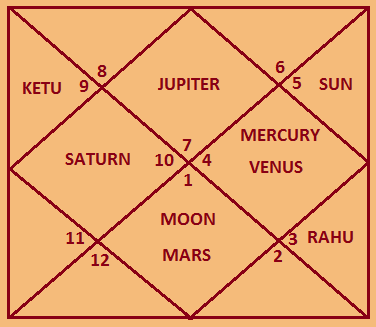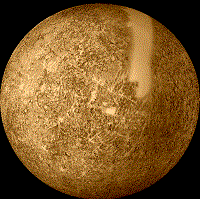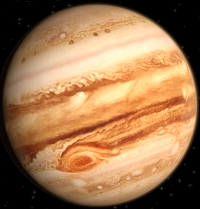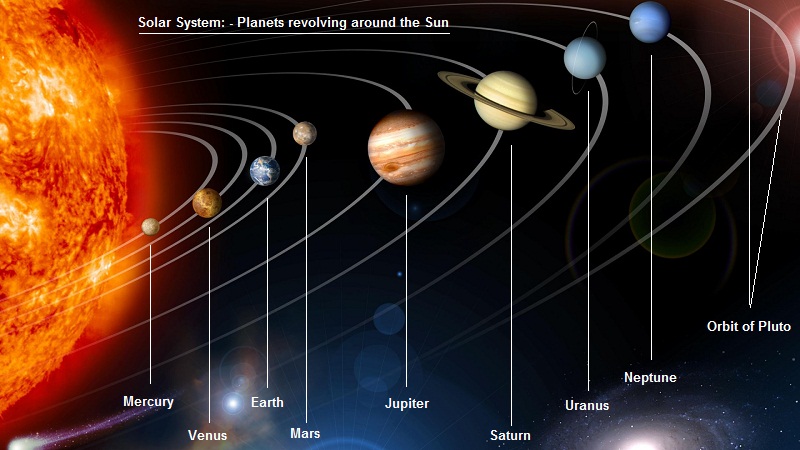9/Nine Planets or Grahas
in Indian Vedic Astrology



9/Nine Planets or Grahas
in Vedic Indian Astrology
By: - Dr.A.S.Kalra Astrologer
| No. | Planet or Graha |
|---|---|
| 1 | Sun or Surya |
| 2 | Moon or Chandra |
| 3 | Mars or Mangal |
| 4 | Budh or Mercury |
| 5 | Jupiter or Guru |
| 6 | Venus or Shukra |
| 7 | Saturn or Shani |
| 8 | Rahu |
| 9 | Ketu |

Sun or Surya

Moon or Chandra

Mars or Mangal

Mercury or Budh

Jupiter or Guru

Venus or Shukra

Saturn or Shani

Sun or Surya
In Indian Vedic astrology, the Sun holds great significance and is considered one of the most powerful celestial bodies. The Sun, known as "Surya" in Sanskrit, is considered the soul of the universe and represents the core essence of an individual's personality and vitality. The Sun is associated with the zodiac sign Leo and is considered its ruling planet. It signifies leadership, authority, self-expression, creativity, confidence, and vitality. The Sun is associated with the element of fire and is considered a masculine and active energy. In Vedic astrology, the Sun is regarded as a source of light and life force. It represents the father figure and is associated with qualities such as ambition, willpower, and determination. The Sun is considered the significator of the self, ego, and individuality. The position of the Sun in an individual's birth chart, also known as the Sun sign, reveals important insights into their core identity and life purpose. It governs the individual's character, behavior, and overall personality. The Sun's placement in different houses of the birth chart indicates the areas of life where the individual is likely to shine and express their unique qualities. The Sun is also associated with health and vitality. It represents physical well-being, energy, and vitality. A strong and well-placed Sun in the birth chart is believed to bestow good health, vitality, and a strong constitution. In Vedic astrology, worship and reverence of the Sun are considered important for its beneficial effects. Practices such as Surya Namaskar (Sun salutation), meditation, and recitation of mantras dedicated to the Sun are believed to enhance one's connection with the divine energy of the Sun and promote overall well-being. It is important to note that the interpretation and significance of the Sun in Vedic astrology may vary depending on the overall context of an individual's birth chart and the interactions with other planets. Consulting a professional astrologer can provide a more personalized and comprehensive understanding of the Sun's influence in an individual's life.Moon or Chandra
In Indian Vedic astrology, the Moon, known as "Chandra" in Sanskrit, holds significant importance. The Moon represents the mind, emotions, instincts, and the subconscious. It is considered one of the most influential celestial bodies in shaping an individual's personality and behavior. The Moon is associated with the zodiac sign Cancer and is considered its ruling planet. It symbolizes nurturing, sensitivity, intuition, and the ability to connect emotionally with others. The Moon is associated with the element of water and is considered a feminine and receptive energy. In Vedic astrology, the Moon is regarded as a luminary that governs the tides, seasons, and the cyclical nature of life. It represents the mother figure and is associated with qualities such as nurturing, compassion, and emotional well-being. The position of the Moon in an individual's birth chart, also known as the Moon sign, plays a crucial role in understanding their emotional nature, instincts, and responses to various situations. It reflects one's emotional needs, comfort zones, and patterns of behavior. The Moon's placement in different houses of the birth chart indicates the areas of life where emotional fulfillment and sensitivity are expressed. The Moon is also associated with creativity, imagination, and artistic abilities. It governs the realm of dreams, subconscious patterns, and the ability to tap into one's intuitive and psychic faculties. In Vedic astrology, worship and reverence of the Moon are considered important for its beneficial effects. Practices such as chanting specific mantras dedicated to the Moon and observing rituals on certain lunar phases, such as Purnima (full moon) and Amavasya (new moon), are believed to enhance emotional well-being and inner harmony. It is important to note that the interpretation and significance of the Moon in Vedic astrology may vary depending on the overall context of an individual's birth chart and the interactions with other planets. Consulting a professional astrologer can provide a more personalized and comprehensive understanding of the Moon's influence in an individual's life.Mars or Mangal
In Indian Vedic astrology, Mars, known as "Mangal" or "Kuja" in Sanskrit, is a planet of great significance. It represents energy, action, courage, drive, passion, and the pursuit of desires. Mars is associated with the qualities of strength, assertiveness, willpower, and determination. Mars is considered a fiery planet and is associated with the element of fire. It rules over the zodiac sign Aries and is also the co-ruler of Scorpio. Mars is considered a masculine energy and is known for its dynamic and assertive nature. In Vedic astrology, Mars is associated with various aspects of life, including ambition, competition, physical strength, courage, leadership abilities, and self-confidence. It governs the qualities needed for success in sports, military endeavors, entrepreneurship, and other ventures that require initiative and assertiveness. The position of Mars in an individual's birth chart, known as the Mars sign, provides insights into their assertiveness, passion, and how they assert themselves in various areas of life. It also indicates the energy levels and the ability to overcome obstacles and challenges. Mars is known for its aggressive and combative nature, which can manifest positively as a strong drive for achievement or negatively as anger, impulsiveness, or conflicts. It is believed that the influence of Mars can amplify one's competitive spirit and determination to succeed. In Vedic astrology, Mars is associated with the "Mangal Dosha" or "Kuja Dosha," which is considered an astrological condition that may bring challenges in marital relationships. However, specific remedies and rituals can be performed to mitigate the effects of this dosha. Worship and propitiation of Mars, such as chanting Mars mantras and performing rituals on Tuesdays (the day associated with Mars), are believed to help balance its energy and enhance its positive qualities. Wearing a gemstone called a "Mars stone" or "Mangal Ratna" is also considered beneficial for strengthening Mars-related influences. It's important to remember that the interpretation and impact of Mars in an individual's life can vary depending on its placement in the birth chart and its interactions with other planets. Consulting with a knowledgeable Vedic astrologer can provide a more personalized and comprehensive understanding of Mars' influence in an individual's horoscope.Budh or Mercury
In Indian Vedic astrology, Mercury, known as "Budha" in Sanskrit, is a planet of great significance. It represents intellect, communication, logic, adaptability, learning, and the power of expression. Mercury is associated with the qualities of intelligence, wit, curiosity, and agility of the mind. Mercury is considered a neutral planet and can take on the qualities of the planets it is associated with or influenced by. It rules over the zodiac signs Gemini and Virgo. It is known for its quick thinking, analytical abilities, and versatility. Mercury governs various aspects of life, including communication skills, analytical thinking, learning abilities, reasoning, writing, speaking, business transactions, and negotiation. It is associated with professions related to writing, teaching, journalism, public speaking, commerce, and any field that requires effective communication. The position of Mercury in an individual's birth chart, known as the Mercury sign, provides insights into their communication style, intellectual abilities, learning patterns, and adaptability. It also indicates how they process information, express themselves, and engage in intellectual pursuits. Mercury is known for its duality, symbolizing both the positive and negative aspects of the mind. Its influence can manifest positively as sharp intellect, effective communication, and adaptability to different situations. However, it can also manifest negatively as restlessness, indecisiveness, overthinking, and miscommunication. In Vedic astrology, Mercury is believed to be influenced by other planets and can take on their qualities. Its relationship with other planets in the birth chart can impact an individual's communication style and intellectual pursuits. Worship and propitiation of Mercury, such as chanting Mercury mantras and performing rituals on Wednesdays (the day associated with Mercury), are believed to help enhance its positive influences. Wearing a gemstone called a "Mercury stone" or "Budha Ratna" is also considered beneficial for strengthening Mercury-related influences. It's important to note that the interpretation and impact of Mercury in an individual's life can vary depending on its placement in the birth chart and its interactions with other planets. Consulting with a knowledgeable Vedic astrologer can provide a more personalized and comprehensive understanding of Mercury's influence in an individual's horoscope.Jupiter or Guru
In Indian Vedic astrology, Jupiter, known as "Guru" or "Brihaspati" in Sanskrit, is considered one of the most auspicious and benefic planets. It is the largest planet in our solar system and holds great significance in astrology. Jupiter represents wisdom, knowledge, expansion, growth, spirituality, and good fortune. Jupiter is associated with qualities such as optimism, generosity, wisdom, higher learning, justice, and morality. It is known as the planet of abundance and blessings. Jupiter is believed to bring positive influences, prosperity, and success in various areas of life. Jupiter rules over the zodiac signs Sagittarius and Pisces. It is considered the natural significator of the 9th house, which represents higher education, spirituality, fortune, and luck. In astrology, Jupiter is associated with broadening one's horizons, seeking knowledge, and embracing higher truths. It symbolizes the pursuit of wisdom, philosophy, and spirituality. Jupiter's influence encourages growth, expansion, and the ability to see the bigger picture. People with a strong Jupiter in their birth chart are often characterized by their optimism, faith, and belief in higher principles. They tend to be wise, generous, and have a strong moral compass. Jupiter is associated with professions such as teaching, law, philosophy, spirituality, and religious leadership. The placement of Jupiter in an individual's birth chart, known as the Jupiter sign, provides insights into their beliefs, values, sense of purpose, and areas of life where they are likely to experience growth and abundance. It also indicates their potential for success, fortune, and opportunities. Jupiter's influence is believed to bring blessings and positive outcomes in various areas of life, including education, career, wealth, relationships, and spiritual pursuits. It is associated with auspicious events, prosperity, and fortunate circumstances. Devotion and worship of Jupiter, such as chanting Jupiter mantras and performing rituals on Thursdays (the day associated with Jupiter), are believed to strengthen its positive influences. Wearing a gemstone called a "Jupiter stone" or "Guru Ratna," such as yellow sapphire, is also considered beneficial for enhancing Jupiter-related energies. It's important to note that the interpretation and impact of Jupiter in an individual's life can vary depending on its placement in the birth chart and its interactions with other planets. Consulting with a knowledgeable Vedic astrologer can provide a more personalized and comprehensive understanding of Jupiter's influence in an individual's horoscope.Venus or Shukra
In Indian Vedic astrology, Venus, known as "Shukra" in Sanskrit, is considered a highly significant planet. It represents love, beauty, harmony, pleasure, sensuality, art, creativity, luxury, and relationships. Venus is associated with feminine energy and plays a crucial role in shaping one's personal and social life. Venus is known as the planet of love and romance. It influences our romantic relationships, marriage, and partnerships. It governs attraction, passion, sensuality, and the ability to form harmonious connections with others. Venus also governs beauty, aesthetics, and the appreciation of art and culture. Venus rules over the zodiac signs Taurus and Libra. It is considered the natural significator of the 2nd and 7th houses, which are related to wealth, family, relationships, marriage, and partnerships. Individuals with a strong Venus in their birth chart are often characterized by their charm, grace, attractiveness, and social skills. They have a deep appreciation for beauty, art, and aesthetics. Venus endows them with a magnetic and charismatic presence that draws people towards them. Venus is associated with professions related to art, beauty, fashion, design, music, luxury goods, entertainment, and the healing arts. It also influences careers in diplomacy, counseling, and relationship-oriented fields. The placement of Venus in an individual's birth chart, known as the Venus sign, provides insights into their love life, romantic inclinations, aesthetic preferences, and social interactions. It also indicates their ability to form and maintain harmonious relationships. Venus is believed to bring pleasure, enjoyment, and happiness in various areas of life. It is associated with material comforts, luxuries, and sensual pleasures. The influence of Venus is seen in experiences related to love, marriage, relationships, artistic pursuits, and a sense of inner harmony. Devotion and worship of Venus, such as chanting Venus mantras and performing rituals on Fridays (the day associated with Venus), are believed to enhance its positive energies. Wearing a gemstone called a "Venus stone" or "Shukra Ratna," such as a diamond or white sapphire, is also considered beneficial for strengthening Venus-related influences. It's important to note that the interpretation and impact of Venus in an individual's life can vary depending on its placement in the birth chart and its interactions with other planets. Consulting with a knowledgeable Vedic astrologer can provide a more personalized and comprehensive understanding of Venus's influence in an individual's horoscope.Saturn or Shani
In Indian Vedic astrology, Saturn, known as "Shani" in Sanskrit, is considered one of the most influential planets. It represents discipline, responsibility, hard work, perseverance, karma, restrictions, limitations, and the lessons learned through life experiences. Saturn is often associated with challenges and obstacles, but it also offers opportunities for growth and spiritual development. Saturn is known as the taskmaster of the zodiac and is associated with discipline and structure. It governs the principles of time, patience, endurance, and the need for practicality. Saturn's influence encourages individuals to work hard, be disciplined, and take responsibility for their actions. Saturn rules over the zodiac sign Capricorn and is also considered the natural significator of the 10th and 11th houses in the birth chart. These houses are associated with career, social status, ambitions, achievements, friendships, and gains. Individuals with a strong Saturn in their birth chart are often characterized by their perseverance, ambition, and ability to endure hardships. They are disciplined, practical, and have a strong sense of responsibility. Saturn's influence can bring maturity, wisdom, and a strong work ethic to individuals. Saturn's placement in the birth chart, known as the Saturn sign, provides insights into one's life lessons, areas of growth, and the challenges they may face. It indicates the areas of life where discipline, hard work, and patience are required to achieve success. Saturn's influence can shape a person's career path, relationships, and overall life experiences. Saturn's transit, or movement through the zodiac, is believed to have a significant impact on individuals. Its transit over specific houses in the birth chart can bring challenges, lessons, and opportunities for growth. Saturn's influence is often associated with major life events, such as career changes, relationship shifts, and periods of self-reflection. While Saturn is often associated with difficulties and delays, its influence also brings the potential for long-term success, stability, and spiritual growth. It teaches individuals the importance of perseverance, responsibility, and learning from past experiences. The challenges posed by Saturn are seen as opportunities for personal development and growth. Devotion and worship of Saturn, such as reciting Saturn mantras or performing rituals on Saturdays (the day associated with Saturn), are believed to appease its energies and mitigate its challenging effects. Wearing a gemstone called a "Saturn stone" or "Shani Ratna," such as a blue sapphire or amethyst, is also considered beneficial for strengthening Saturn-related influences. It's important to note that the interpretation and impact of Saturn in an individual's life can vary depending on its placement in the birth chart and its interactions with other planets. Consulting with a knowledgeable Vedic astrologer can provide a more personalized and comprehensive understanding of Saturn's influence in an individual's horoscope.Rahu
In Indian Vedic astrology, Rahu is considered a shadow planet, also known as a "Chaya Graha." Rahu does not have a physical existence but is a sensitive point in the celestial sphere that represents the lunar north node. It is often associated with mystery, illusion, and worldly desires. Rahu is believed to be the head of a celestial serpent that swallows the Sun and the Moon, causing eclipses. It is associated with the principle of desire, ambition, obsession, and materialistic pursuits. Rahu's influence is considered strong and intense, and it can create both positive and negative effects in an individual's life. Rahu is known as a malefic planet in Vedic astrology, representing challenges, obstacles, and worldly attachments. Its influence is often associated with sudden changes, unexpected events, and unconventional experiences. Rahu is believed to amplify desires and can lead to excessive ambition, greed, and materialistic tendencies if not balanced. The placement of Rahu in the birth chart, known as the Rahu sign, provides insights into an individual's karmic lessons, desires, and areas of growth. Rahu's influence can indicate the areas of life where an individual may experience obsessions, cravings, or challenges related to material success and worldly pursuits. It can also bring opportunities for spiritual growth and transformation. Rahu's transit, or movement through the zodiac, is believed to have a significant impact on individuals. Its transit over specific houses in the birth chart can bring sudden changes, ups and downs, and transformative experiences. Rahu's influence can trigger karmic events and lessons that help individuals evolve and learn. Devotion and worship of Rahu, such as reciting Rahu mantras or performing rituals on Saturdays or during Rahu Kalam (an inauspicious time associated with Rahu), are believed to appease its energies and mitigate its challenging effects. Wearing a gemstone called a "Rahu Ratna," such as a hessonite garnet or gomedh, is also considered beneficial for balancing Rahu-related influences. It's important to note that the interpretation and impact of Rahu in an individual's life can vary depending on its placement in the birth chart and its interactions with other planets. Consulting with a knowledgeable Vedic astrologer can provide a more personalized and comprehensive understanding of Rahu's influence in an individual's horoscope.Ketu
In Indian Vedic astrology, Ketu is considered a shadow planet, also known as a "Chaya Graha." Ketu is the lunar south node, representing the point where the Moon's path intersects with the ecliptic. It is believed to have a strong influence on an individual's spiritual growth and karmic evolution. Ketu is often associated with spiritual enlightenment, liberation, and detachment from worldly attachments. It is considered a significator of mystical experiences, psychic abilities, and intuitive insights. Ketu's influence is often associated with past-life experiences, karmic patterns, and spiritual lessons. Ketu is known as a malefic planet in Vedic astrology, representing challenges, obstacles, and inner conflicts. Its influence can be disruptive and unpredictable, causing sudden changes, ups and downs, and unexpected events. Ketu's energy is associated with detachment, renunciation, and letting go of material desires. The placement of Ketu in the birth chart, known as the Ketu sign, provides insights into an individual's karmic path, spiritual aspirations, and areas of growth. Ketu's influence can indicate the areas of life where an individual may experience challenges, inner conflicts, and the need for spiritual transformation. Ketu's transit, or movement through the zodiac, is believed to have a significant impact on individuals. Its transit over specific houses in the birth chart can bring profound spiritual experiences, karmic events, and the opportunity for personal growth and self-realization. Devotion and worship of Ketu, such as reciting Ketu mantras or performing rituals on Tuesdays or during Ketu Kalam (an inauspicious time associated with Ketu), are believed to appease its energies and mitigate its challenging effects. Wearing a gemstone called a "Ketu Ratna," such as a cat's eye gemstone or lehsunia, is also considered beneficial for balancing Ketu-related influences. It's important to note that the interpretation and impact of Ketu in an individual's life can vary depending on its placement in the birth chart and its interactions with other planets. Consulting with a knowledgeable Vedic astrologer can provide a more personalized and comprehensive understanding of Ketu's influence in an individual's horoscope.
